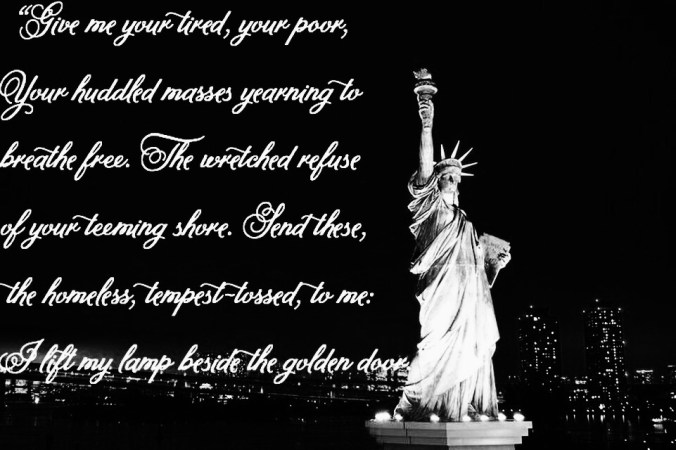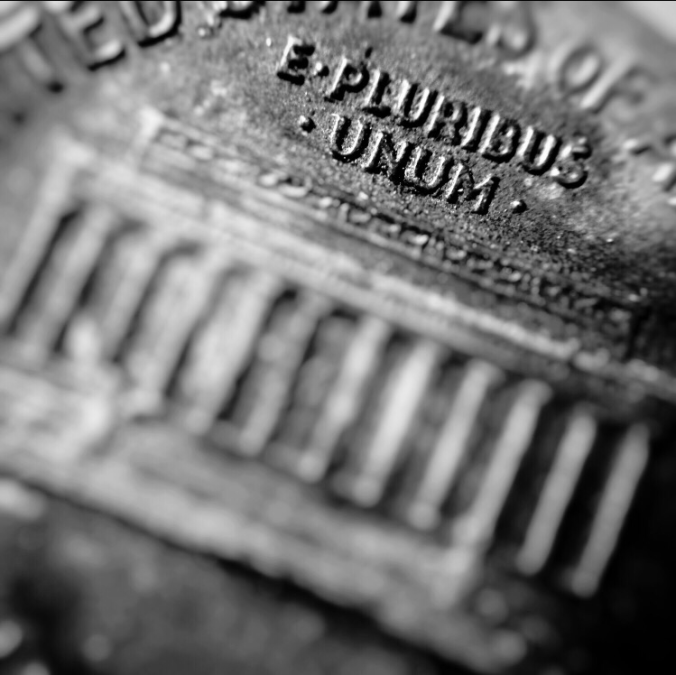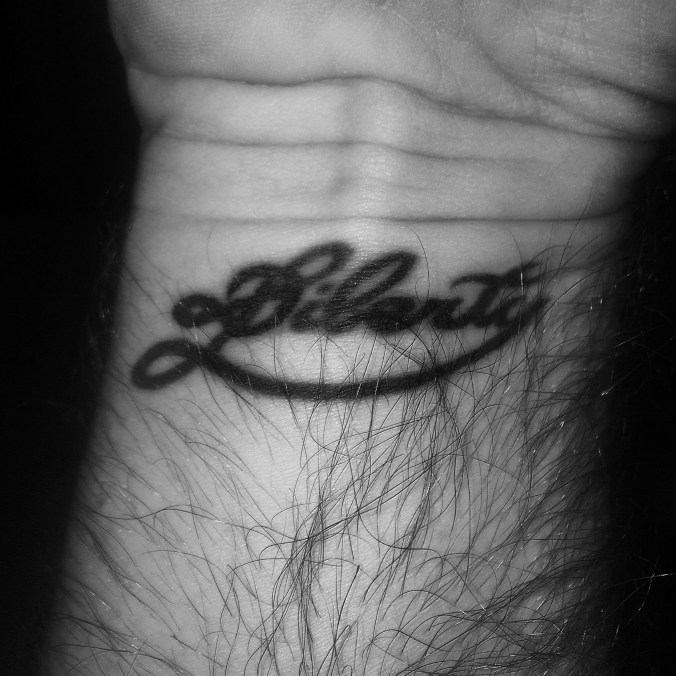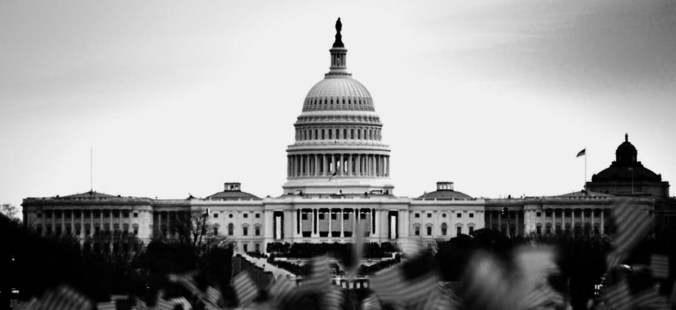 Each time we assemble to inaugurate a new president of the United States of America we affirm a commitment to both, continuity and change. For if we meet our obligations as citizens the existence of our union shall be perpetual, but the ways in which we seek to perfect it must endlessly evolve.
Each time we assemble to inaugurate a new president of the United States of America we affirm a commitment to both, continuity and change. For if we meet our obligations as citizens the existence of our union shall be perpetual, but the ways in which we seek to perfect it must endlessly evolve.
As we gather today the debris left in the wake of the storms that raged when President Obama took office still lays across our landscape, complicating our foreign policy, poisoning our political discourse, diminishing the bonds between fellow citizens, and leaving us to ask, “how in a nation of such wealth can unprecedented levels of inequality persist?”
This leaves us at a defining moment. As humbled stewards of this nation, we are entrusted with the responsibility to ensure that our course be righteous, that America be true to its founding principles, and that the country we leave our children be one that is more just, equal, and free than that which we inherited.
As we lift our gaze beyond our shores we find a world in turmoil. Climate change continues to wreak havoc on weather patterns, causing life-threatening natural disasters with startling regularity. Starvation plagues large swaths of the world’s poor and civil wars ravage the lives of innocent citizens across the globe. Terrorism continues its assault on democracy, peace, and human decency. Opportunistic leaders of deteriorating nations are attempting to exploit the upheaval to their advantage by creating spheres of influence where their relative power increases and human rights diminish. Meanwhile the pressures of globalization have proven that progress is not without cost.
At home a tumultuous election with foreign interference has laid bare divisions that cut in every direction across our citizenry, calling into question much of the progress we have made. A vitriolic campaign exposed deep divisions and a lack of empathy between disparate groups of Americans leaving wounds still unhealed. Our political discourse is as dysfunctional as ever. The disconnect between the outcomes of those who vote and those who are voted for has never been larger, producing widespread apathy and disillusionment amongst the American electorate whose trust in government our democracy depends.
The American dream feels more out of reach than ever as the rungs of the economic ladder spread further apart each year. Policies perpetuating the precipitous decline of the middle class and poor are producing levels of inequality previously unimaginable in a wealthy country. Healthcare, while covering the largest percentage of Americans ever, remains too expensive, with access to quality care too limited. Our schools continue to fail too many and higher education continues to cost too much.
The forces enveloping the world are pushing us in directions unexpected while gales of change and intolerance threaten to blow apart decades of progress and stability. Calls not that dissimilar to those echoing across Europe are imploring us to close our borders, turn our backs on the world, lose faith in our alliances, and abandon our values. Taken together the tide of current events is threatening to wash away the very foundations of our democracy.
Though strong may be the current, our resolve shall not weaken, and we, the American people, will not be swept asunder the torrents of current events. I have confidence in that affirmation for I know our history, believe in our values and have faith that America remains the world’s last best hope.
So fear not my fellow citizens, for we have endured much worse storms and proven that there exist no challenge unbendable to the undying will and unbreakable spirit of the American people. Today let us proclaim that we do not fear any challenge. For we are, by origin of our birth, a hopeful and optimistic people whose hope springs from a reservoir of progressive history so deep that we cannot help but believe that success and progress are our destiny. That no matter how divisive the issue or grand the challenge, that we will, with grit and determination, hard work and unity of purpose, prevail.
However, the turmoil of today has called into question the wisdom of our foreign policy and the globalist agenda our leaders have pursued. Cynics question whether the effects of globalization have benefitted our lives and whether we should insulate ourselves from the negative outcomes it has produced.
It is beyond debate, that as the world grows more open, people have become evermore insecure with their place in it. Trips that used to take months, now take hours. A message written in Detroit arrives in Dubai within the blink of an eye. This is the reality of the world today and there is no turning back the clock on progress or technology. Building a wall or a bomb no longer provides security when the click of a mouse in Moscow can wreak havoc on our financial institutions or diminish the sanctity of our elections.
The benefits of globalization have forced upon us the responsibilities as well. We cannot consciously drop bombs in the Middle East and not accept displaced refugees in the Midwest. Nor can we claim to be pro-life protesting outside of clinics while simultaneously allowing Syrian children to be murdered in Aleppo. A foreign child’s life is worth as much as the potential that an unborn American child holds.
We are confronted with the dichotomy that while open borders can allow terrorists to cross them, they also allow for the free flow of culture and commerce that enriches our lives and enhances our cultural awareness. There is no question that America, truly a nation of immigrants, has benefitted from immigration nor that immigration has had unintended consequences. From disruptions of our labor force to 9/11, it is clear that there are drawbacks to the interconnected world in which we live just as there are benefits. Nowhere is this fact more apparent than on the internet.
While the internet has brought the world to our fingertips, it has also provided a platform for radicals to spread their warped views. Though enemies of peace pervert the sacred scriptures of peaceful faiths to radicalize their followers on Facebook, they find themselves standing on a diminishing base of ignorance as knowledge expands. They are relics of a world that no longer exists, clinging to a perverse worldview whose outlook grows dimmer as our world becomes more connected. Their draw diminished more each day as the light of our common humanity shines and the darkness of our differences erodes.
Throughout our history visionary leaders of these United States have reached across the globe and forged alliances with nations who share our values to ensure the endurance of our union. We have helped build international organizations and crafted trade deals providing for all parties increased measures of prosperity, peace, stability, and security while agreeing to combat climate change, prevent the spread of nuclear weapons, isolate rogue nations and diminish their ability to destabilize the world.
From the free flow of ideas, commerce, people, and capital to the relatively peaceful relations between the great powers of the world since the end of WWII, the benefits of globalization cannot be easily dismissed. Firm in the belief that engaging the world is in our best interest, the United States has built as many bridges to the world as possible.
We have provided life saving medications to people who are ill, books to children who wish to read, funded disaster relief when the grounds quaked and the floodwaters rose, supplied peacekeeping troops, opened our homes to refugees of conflicts when those peacekeeping missions have fallen short, and donated food to those who are starving.
We know that it is not only right to do these things but far less expensive than influence by the use of force. The price of a book or a meal pales in comparison to the price of a fighter jet, but its impact is no less profound to the curious mind or empty stomach of a starving child.
My fellow Americans, our power does not emanate from the size of our military alone, but also from size of our heart. We are a decent people who value compassion and empathy, hope and integrity, fairness and equality. Our willingness to open our home to a refugee, to forgive old foes and form new alliances, to pick up those who have fallen and give a handout to those in need, is what shines light into the deepest and darkest, most hope-ridden and scary corners of this world. It’s what makes Americans special. It’s what makes America exceptional.
Therefore we must continue to build bridges and not walls. For not only our security, but also our influence, our ability to shape an unpredictable world, relies upon being engaged with that world. We will expand upon agreements that enhance our security, increase our prosperity, and slow the warming of our planet. Let us resolve to make friends and not enemies, to seek understanding in the absence of awareness, and to always be committed to being a part of something much larger than ourselves.
While remaining engaged with the world, we must also remain true to our values at home. Let us affirm once and for all, that diversity and immigration are the bedrock of our nation’s foundation and not a threat to our national identity nor our security. To law abiding immigrants and dreamers, you may or may not have chosen to come here, but you will be afforded the opportunity to stay here and pursue your own American dreams.
It is that quintessential American belief that each generation of Americans will fare better than the last that continues to draw immigrants to our shores. Yet as we gather today, the luster of the American dream is fading, not just for immigrants but also for native born Americans. With each passing year it becomes more apparent that misplaced priorities and ineffective policies are increasing inequality.
Too often we debate about what trickle down tax policies can help build, and not what they destroy, for in their propensity to exacerbate inequality they destroy the footings upon which the American dream is built. If we are to ever make the American dream a reality again, we must craft tax and trade policies with workers in mind and not the corporations whose labor they supply. We are a nation of people, not business entities. We must remember that the government’s interest is in ensuring prosperity for people not profits for corporations.
Today I say to those who get rich while impoverishing their workers, who exploit lax labor laws, bust unions, cut wages, ship jobs over seas, and do not share in the bounty which such self-centered actions produce, your days of getting ahead on the backs of the middle class and working poor are numbered. We will no longer stand for policies that favor the few over the many, that give the most to who need it least and the least to who need it most.
The middle class and working poor of this nation are proud people who take pride in the work they do. They do not want to be arbitrarily handed money, but instead to keep more of the money they earn. They do not want to take advantage of the system, but they also do not want to be exploited by it either.
May we reject as false the belief that the gains of some must come at the expense of others. We rise and fall as one nation, as one people. If someone is poor or middle class, those designations know not their skin color, but only their income. The loss of a job for a middle class black family from Chicago inflicts the same economic hardships and tough choices on those of a white family from Appalachia similarly afflicted.
Every American adult no matter their race, nor their gender, sexual orientation or religion, has a right to work at a job that does not discriminate against them for who they are, but rewards them for what they can do. The diversity of our god given talents, and hard earned skills, deserves a minimum wage that is livable and dignified, an opportunity that is unbiased, healthcare that is neither too expensive nor too hard to find, child care that does not bankrupt, and a safety net that is not threatened by partisan politics.
Every American child should grow up in a world where the only limit to their dreams is their willingness to work hard to achieve them. Too often our destination is determined by the limitations of our origins and not the size of our dreams. We must ensure that the biggest influences on a child’s chances for success are the quality of their education and the support of their parents give and not the city block or dirt road upon which they are raised. For only when all of our children from the most disparate of origins have the same chances to reach the same destinations can we ever hope to end inequality in this country.
We know that reversing the trend toward inequality will not be easy. That it will not come without setbacks and frustrations, differences of opinion and diverse policy proposals, but the course must be traveled. For the trust of the people depends upon their government’s ability to deliver equality and opportunity, and when that trust is eroded, when the bonds between citizens and their leaders weakens, then, and only then is our democracy existentially endangered.
I know the debate in the years ahead will be vigorous, as well it should be. But I ask those lawmakers seated behind me today to keep a promise to the American people. I ask that everyday when you walk through the doors of the Capitol, that you think about the men and women in your districts and not those in your respective caucuses. That if you make a statement, that it be with the voice of your constituents. That if you take a stand that it be for the American people and not your party, donors, or special interests. That when we debate, that it be civil. That when we disagree, that it be done respectfully, and that we come together and not forget that we are a government, of, by, and most importantly, for the people.
To all of the Americans across this magnificent mall and beyond. I know elections, by nature, are divisive. They can leave you cynical, lacking faith in your leaders, angry at your neighbor, and mistrusting of those who do not look like you. I know that sometimes in the vitriol of our debates, the purpose of why we’re debating in the first place gets lost in the heat of the moment.
I ask of you today to pause and reflect about all that his great nation has given to you, the potential that America holds, and what dreams you have for yourself and future generations. I ask that you realize that in the absence of unity none of it will ever come to fruition.
So at this time we may not understand each other, but we can affirm that we would like to know one another better. We can choose a new, better, and more united way forward than the divided path upon which we have traveled. We do not have to sacrifice the things we believe in to better understand people we do not agree with. We can and always will hold differing opinions, but that does not mean our conversations must always be disagreeable, or that we cannot respect the differing opinions of others.
What has been, does not have to be. We are no more bound by our past than set free by our future. We can, if we open our minds and our hearts, find a part of ourselves in our shared experience as Americans. We can make those marginalized feel as if they have a place in this country as well.
We must do this in order to remain true to our origins. Our founders, faced with unfathomable odds, drew upon their shared grievances and set aside their differences, found strength in the cause of something larger than themselves, pledged not just their lives, but their sacred honor and fortunes, so that the spirit of the revolution might endure. With little more than hope they committed themselves to a seemingly impossible task. Yet in their unity they found strength, in their strength they found courage, and in their courage the will to face down tyranny and defeat England.
Though the scale of our challenges be great, we are not faced with such daunting odds as our founders. However, we are faced with a decision of what kind of country we are and what kind of a country we want to be. We are confronted with the uncomfortable truth that we have hard work left to do if we are to pass on to future generations a better country than the one we inherited.
Will we summon the courage to not just look in the mirror and see what is wrong, but also the wisdom to look at others and see what is right? Can we find the self-control to recoil from our propensity to divide ourselves over things immaterial to who we are and find ground that is common with people who are foreign?
A better future is not guaranteed but is attainable if we apply ourselves to the cause at hand and commit ourselves to confronting the challenges we face united. If we choose to seek understanding when we do not know, common ground when we are apart, and unity over division, then we will succeed in passing forth to future generations those sacred gifts our founders fought and died for. Of no higher calling can I reason, so may we commit nothing less than our full measure of devotion, to building bridges and not walls.
Thank you, and may god bless the United States of America.
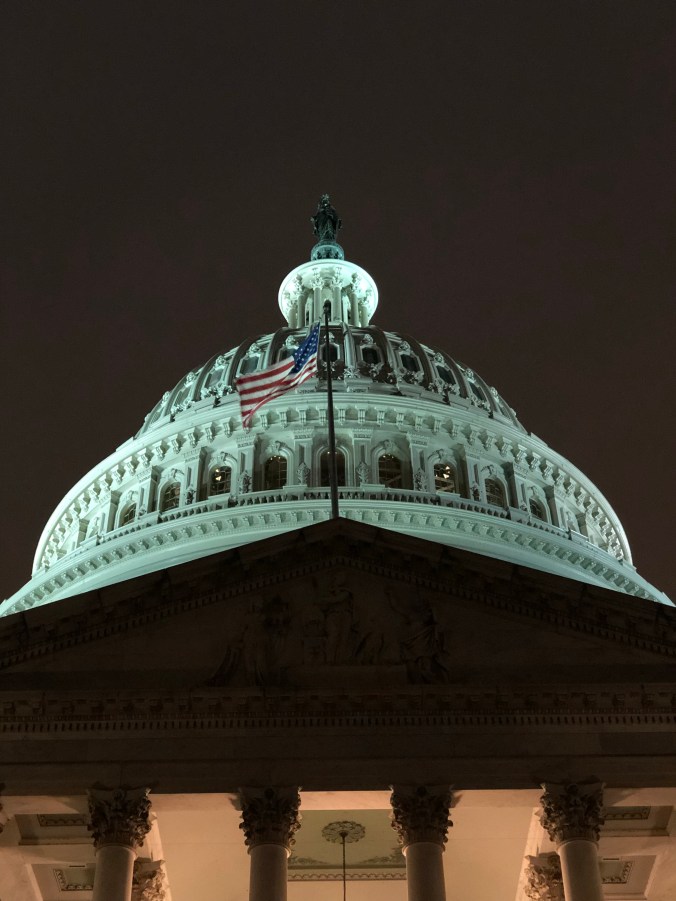
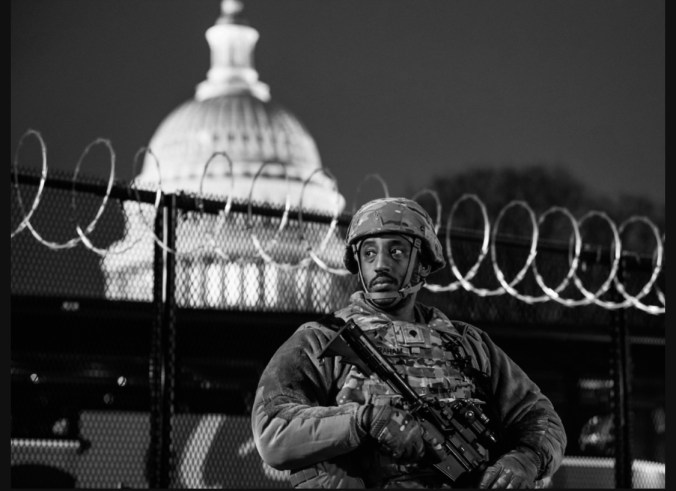 Donald Trump being elected President of the United States in 2016 came as a complete shock to me as it did to many people across America. It was a harsh, cold slap of reality across the face after what I felt were a pretty good eight years. We had emerged from a terrible recession, the economy had been expanding for the longest stretch of time in modern history, and more people were insured than at any other time in this nation’s history – and still a man had just been elected who talked about blowing up the whole thing.
Donald Trump being elected President of the United States in 2016 came as a complete shock to me as it did to many people across America. It was a harsh, cold slap of reality across the face after what I felt were a pretty good eight years. We had emerged from a terrible recession, the economy had been expanding for the longest stretch of time in modern history, and more people were insured than at any other time in this nation’s history – and still a man had just been elected who talked about blowing up the whole thing.

 Four days later, I am still heartbroken for America, and while my tears of rage have dried I am no less angry with what happened to a place I once knew well.
Four days later, I am still heartbroken for America, and while my tears of rage have dried I am no less angry with what happened to a place I once knew well.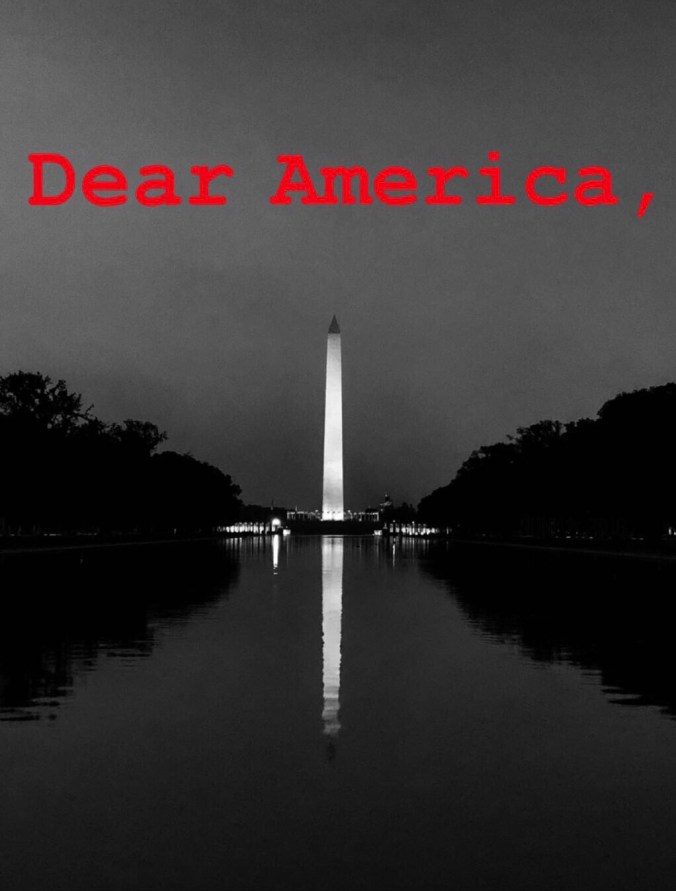 Dear America,
Dear America, My president is racist. It honestly pains me to even type that. I hate it. I never imagined having to say such a thing. Before the last year the thought of having to do so was honestly, kind of absurd. It was never that I thought racism was dead. Thankfully I have never been naive to the fact that racism still exists, even if less overtly expressed. I grew up in two multi-racial households, most of my friends in my neighborhood were black. I never had the privilege to just look the other way. When they were hurt by racism, I hurt for them. I saw the damage that racism could still inflict upon the sense of self-worth and dignity of minorities firsthand in a supposedly enlightened society. So I knew racism was alive and well in 21st-century America.
My president is racist. It honestly pains me to even type that. I hate it. I never imagined having to say such a thing. Before the last year the thought of having to do so was honestly, kind of absurd. It was never that I thought racism was dead. Thankfully I have never been naive to the fact that racism still exists, even if less overtly expressed. I grew up in two multi-racial households, most of my friends in my neighborhood were black. I never had the privilege to just look the other way. When they were hurt by racism, I hurt for them. I saw the damage that racism could still inflict upon the sense of self-worth and dignity of minorities firsthand in a supposedly enlightened society. So I knew racism was alive and well in 21st-century America.

 Politicians never learn. They just don’t. They might be, for all intents and purposes, the most highly educated and least intellectually malleable group of human beings that have ever existed. I’m not joking. It doesn’t matter their party affiliation, they are, almost every single one of them, afflicted with the same destructive tendency to constantly make political calculations while seemingly being perpetually married to the inability to put aside their own personal interests and ambitions for the greater good of the people they serve. They consistently choose their political viability over the interests of their citizens, apparently being incapable of learning anything aside from the ability to talk out of both sides of their mouth while keeping a straight face.
Politicians never learn. They just don’t. They might be, for all intents and purposes, the most highly educated and least intellectually malleable group of human beings that have ever existed. I’m not joking. It doesn’t matter their party affiliation, they are, almost every single one of them, afflicted with the same destructive tendency to constantly make political calculations while seemingly being perpetually married to the inability to put aside their own personal interests and ambitions for the greater good of the people they serve. They consistently choose their political viability over the interests of their citizens, apparently being incapable of learning anything aside from the ability to talk out of both sides of their mouth while keeping a straight face.

 Last week a nightly news anchor, someone whose journalism I typically respect, started his program by listing the sixteen different women who had accused President Trump of varying degrees of sexual harassment and assault. The presentation was spurred on by the President calling out Senator Al Franken for the sexual abuse he inflicted on tv personality Leeann Tweeden. With each successive name and alleged accusation the anchor ticked off the list, he seemed to become more satisfied with himself and the quality of his “reporting.” Yet, as he progressed through the list, I couldn’t help but think, “Is this where “journalism” has gone? Is this how the free press feels they can best serve democracy? Is this not the worst way to begin a discussion about sexual assault if your intention is for all sides to listen?”
Last week a nightly news anchor, someone whose journalism I typically respect, started his program by listing the sixteen different women who had accused President Trump of varying degrees of sexual harassment and assault. The presentation was spurred on by the President calling out Senator Al Franken for the sexual abuse he inflicted on tv personality Leeann Tweeden. With each successive name and alleged accusation the anchor ticked off the list, he seemed to become more satisfied with himself and the quality of his “reporting.” Yet, as he progressed through the list, I couldn’t help but think, “Is this where “journalism” has gone? Is this how the free press feels they can best serve democracy? Is this not the worst way to begin a discussion about sexual assault if your intention is for all sides to listen?”


